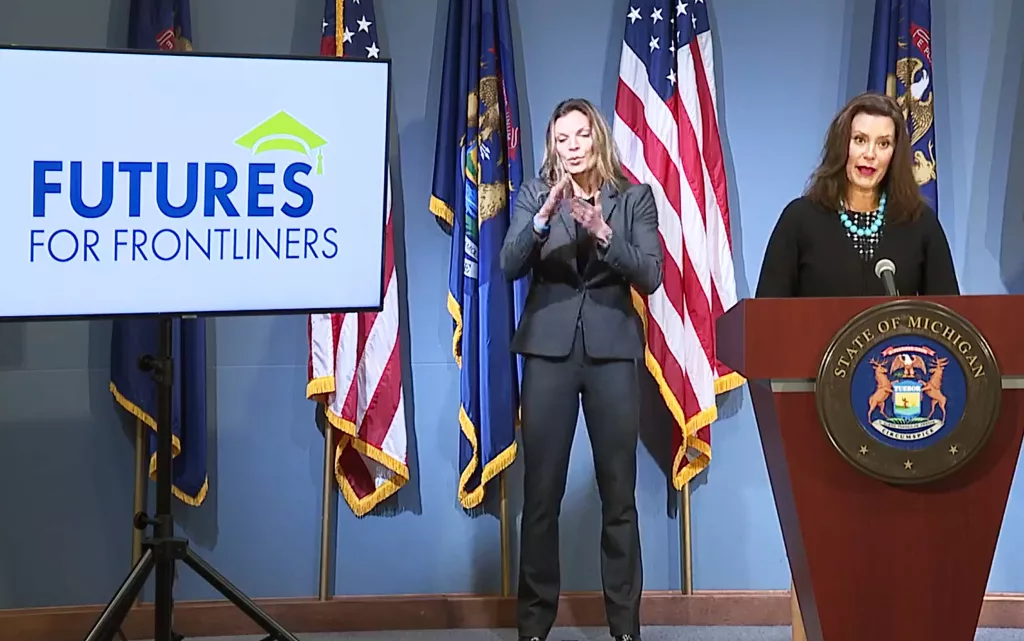If you were wondering how Michigan’s Futures for Frontliners free college offering would go over, there’s a pretty definitive answer on the table today. Applications flowed into the state’s website at a rate in excess of 4,000 per day, with now more than 60,000 applications in hand in just the first two weeks of access.
With just over two weeks since the program launched, more than 60,000 Michiganders have submitted applications for the new program, which is the first such program in the nation to provide a tuition-free pathway to college or a technical certificate to essential workers who do not have a college degree, including those who lack a high school diploma.
Gov. Gretchen Whitmer says, “This past spring, these brave men and women put their lives on the line every day to ensure we have essential services and products we need to stay healthy and safe, I am truly thrilled to see that so many are taking advantage of this program – they earned it.” She adds, “I encourage every eligible frontline worker to see if this free college scholarship opportunity is right for them.”
Michigan is committed to increasing economic opportunity by providing residents greater access to the education and skills that create pathways to better jobs and bigger paychecks.
Dept. of Labor and Economic Opportunity (LEO) director Jeff Donofrio says, “Good paying jobs and a stronger Michigan economy require more of us to have an education beyond high school. The strong interest in Futures for Frontliners shows us that Michiganders are ready to build a brighter, more secure future for themselves and their loved ones,” and adds, “With the economic uncertainty that comes with the COVID-19 pandemic and the thousands of high-skilled jobs going unfilled, there’s no better time to add new skills.”
Meanwhile, to ensure the continued progress towards Gov. Whitmer’s Sixty by 30 education attainment goal, Kerry Ebersole has recently been named Senior Advisor and Director of the Sixty by 30 office within LEO.
The governor says, “The Sixty by 30 goal and the initiatives and programs that will help us reach it are critical to ensuring hardworking Michiganders have a path to economic opportunity and attracting talent to our state. I am thrilled to have Kerry at the helm ensuring we’re on track.”
Ebersole tells us, “In order to help Michiganders on their path to learn new skills needed to succeed in high-demand, high-wage careers, and help businesses fill critical talent needs, we need to remain laser-focused on key programs and partnerships to meet the Sixty by 30 goal,” and adds, “By ensuring 60-percent of working-age Michiganders will have an industry recognized certificate or college degree by 2030, we’re making sure our state remains economically competitive and helping businesses grow, all while fueling the future workforce and providing opportunity for all.”
To discuss how initiatives like Futures for Frontliners can help Michigan residents succeed, and answer questions about the program and how essential workers can take advantage of the opportunity, LEO is hosting an initial series of regional Futures for Frontliners virtual townhall sessions with local education and workforce partners.
- Traverse City/Northern Michigan, Thursday, Oct. 1, 2:30 – 3:30 pm
- Grand Rapids/West Michigan, Tuesday, Oct. 6, 2:30 – 3:30 pm
- Saginaw/Flint/Bay City, Thursday, Oct. 8, 2:30 – 3:30 pm
- Detroit/Southeast Michigan, Tuesday, Oct. 13, 2:30 – 3:30 pm
- Upper Peninsula, Thursday, Oct. 15, 2:30 – 3:30 pm
- Lansing/Central Michigan, Tuesday, Oct. 20, 2:30 – 3:30 pm
You can learn more about Futures for Frontliners at http://www.michigan.gov/Frontliners.
 Kerry Ebersole recently joined LEO as a Senior Advisor and Director of the Sixty by 30 Office. Ebersole has more than 20 years of experience across a wide spectrum of national, state and local politics, issue advocacy, government affairs, nonprofit and philanthropy. Prior to this role, Gov. Whitmer appointed Kerry to serve as the Census 2020 Executive Director, helping lead Michigan to be the first state in the nation to surpass the 2010 response rate. Before returning to state service in 2019, Ebersole was the CEO of Persuasion Link, LLC., a Michigan-based public affairs firm working with labor, businesses, nonprofit and philanthropic organizations.
Kerry Ebersole recently joined LEO as a Senior Advisor and Director of the Sixty by 30 Office. Ebersole has more than 20 years of experience across a wide spectrum of national, state and local politics, issue advocacy, government affairs, nonprofit and philanthropy. Prior to this role, Gov. Whitmer appointed Kerry to serve as the Census 2020 Executive Director, helping lead Michigan to be the first state in the nation to surpass the 2010 response rate. Before returning to state service in 2019, Ebersole was the CEO of Persuasion Link, LLC., a Michigan-based public affairs firm working with labor, businesses, nonprofit and philanthropic organizations.
Michigan’s Sixty by 30 Goal
Michigan’s goal is to increase the number of working-age adults with a high-quality skill certificate or college degree from 45-percent today to 60-percent by 2030. Announced by Governor Whitmer in her First State of the State address, until that point, Michigan was once of just a few states that had not set a statewide post-secondary education goal.
Sixty by 30 seeks to build a better Michigan in three ways:
- Close the skills gap to address talent shortages that pose the single greatest threat to the success of our businesses and our state’s prosperity. These gaps exist because jobs requiring skilled employees today, as well as jobs on the horizon, demand greater education and training than ever before. Increasingly, the best jobs require more than a high school diploma.
- Increase opportunity for Michiganders to have greater access to the education and skills training to create opportunities for better jobs, bigger paychecks and a more equitable economy.
- Make Michigan more competitive for inclusive economic growth.
Learn more about the goal and state’s efforts at http://SixtyBy30.org.






